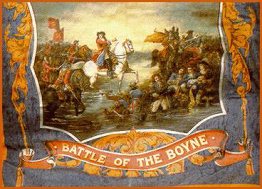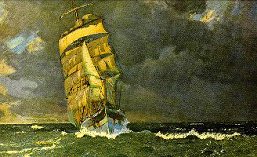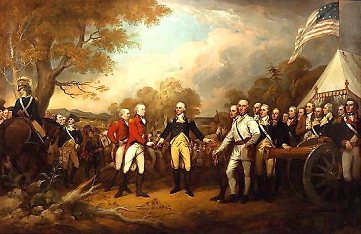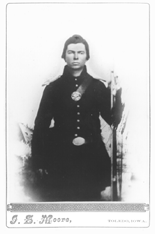Table of Contents
The Scots-Irish McClaughry's
West To America
The War of the Revolution
Into the Wilderness
Robert Houston McClaughry
West to Iowa
The War of the Rebellion
A Family Divided
HISTORY PAGES

PROFILES
The early history McLaury family, dating back to the 17th century. |
| The McLaury brothers come from a long line of warriors, farmers and lawyers. The original spelling of their surname was "McClaughry". In Gaelic, it translates as "Son of the King of the Stone", which may allude to some Scottish royal kinship. The McClaughry's originated from Scotland, but the exact location has yet to be found. They probably migrated to Northern Ireland in the late 1500's during a time in which some 30,000 to 40,000 Scots settled there. The earliest documented McClaughry progenitor was named Matthew. During the War of the Kings, Matthew was a grenadier (cavalryman) under the banner of King William, Prince of Orange. He fought on the side of England in the famous Battle of the Boyne in 1690. It was there the deposed King James II was defeated and William and Mary solidified their hold of the English throne. It is also the beginnings of the strife that has plagued Ireland to this day.  Matthew's loyalty to the throne was rewarded with an iron boot. "Those were times to try men’s souls, and ere long gave rise to a very sad chapter in the history of our family. Through the tyranny and unjust legislation of England, these patriotic and loyal citizens who had suffered and shed blood for the King and Crown, were estranged from their loyalty and became England’s bitter foes, and despairing of justice from the government, these Scottish colonists abandoned the country and emigrated by thousands to America, and eventually became the most determined enemies of England in the war of the Revolution."6 On 9 May 1729, along with a total of 25 of his immediate family, Matthew boarded the George and Ann in Dublin and, two days later, set sail for Philadelphia. As the George and Ann was sailing along the northeast coast of Ireland, Matthew, "on account of infirmities of age and ill health" (one account states he broke his leg) was forced to abandon the voyage. And on the 24th, was let off at Glen Ann, Ireland along with his wife, daughter and youngest son, Thomas. Fortunately, Matthew recovered enough to make the journey back to his home in Longford where he bought back a part of his home from his brother-in-law, Matthew Parks where he resided until his death. The rest of his children, seven in all, as well as 14 others of his immediate family continued on to America. The George and Ann turned out to be a death ship. Beleaguered by unfavorable winds, wrought with epidemic and dwindling rations, the journey took almost five months. "The death of over 100 of their number, including 42 children, had meant almost daily burials at sea."8  With suspicions of piracy from the captain (some thought the voyage was intentionally being prolonged until everyone died and the captain could then claim their possessions) and mutiny from the crew, the desperate ship made landfall at Cape Cod, Mass. There, in early October, the captain reneged on his contract to take them to Philadelphia and left ravaged colony to fend for themselves against the oncoming New England winter.
With suspicions of piracy from the captain (some thought the voyage was intentionally being prolonged until everyone died and the captain could then claim their possessions) and mutiny from the crew, the desperate ship made landfall at Cape Cod, Mass. There, in early October, the captain reneged on his contract to take them to Philadelphia and left ravaged colony to fend for themselves against the oncoming New England winter. The remaining 90 survivors were able to find housing and care by villagers throughout the winter. Many more died that winter. Of the family of Matthew McClaughry, only a son and a grandson were to touch American soil. But the son died just a few days later. It obviously took about a year for Matthew to hear of the tragic fate of his entire family. All brothers, sisters, children and grandchildren were suddenly no more. Only one grandson that they will never again see, and his youngest boy and girl, Thomas and Sarah, remained of their once vibrant family. |
West to America |
Some thirty-six years after the death of his family, Matthew's only remaining son, Thomas left for America with his wife and seven children. They arrived in New York on the eve of a pivotal event in American History; the Stamp Act. Thomas' son, Thomas Jr. would later write about it in his memoirs. "The same evening (13 November, 1765) I landed in New York. The Governor’s Golden Effigy was bornt by a great concourse of people on account of the Stamp Act was imposed by king and government of England. This the Governor (Cadwalader Colden) would, except the Americans would not admit of it..."7
"The same evening (13 November, 1765) I landed in New York. The Governor’s Golden Effigy was bornt by a great concourse of people on account of the Stamp Act was imposed by king and government of England. This the Governor (Cadwalader Colden) would, except the Americans would not admit of it..."7Thomas’ family wintered with his son-in-law in Esopus, NY. In the Spring, they moved to Littlebritain and worked part of a farm belonging to John Reid (Thomas' grandson and Frank & Tom's grandpa was named after him). The next year, the family moved to a farm "near the Wallkill meeting house" owned by George Monell. While living in Littlebritain and Wallkill, Thomas became acquainted with Doctor Clark, the leader of Scottish Presbyterian pilgrims, who invited him and his family to settle on a new patten some 150 miles north at a settlement later to be known as Salem. While the rest of the family traveled by water to Albany and then 52 miles to their new home, Frank and Tom's great grandpa, Thomas Jr. went overland with the family’s cattle, "I wish you to reflect a little and think of the hard fittage I had. I was then the only teamster with my Brother-in-law John Watson, 3 large families and their goods and cattle to move such a distance through woods & a number of waters & a very few houses. We had but one yoke of oxen & cart with some horses. I was almost worn out & team "&c". You may wonder why we did not buy land at Newburgh. I confess we were poor planner & did not know when we were offered a good bargain. But reflecting back on all proceeding I must believe man is to go through so much in his life tine. At last in the month June we came to the woods in Cambridge & encountered many hardships too long to relate."7 Thomas finally sank roots into the land and settled in the township of Salem, Charlotte (now Washington) County, NY with his wife, four sons and three daughters. Thomas' family were yet to endure hardships of an oncoming war and the daily ravages of colonial life, but they had achieved their goal; bring the family to America intact and make a new home. When war finally did break out between the colonists and the British throne, the boys joined the Rebellion. |
The War of the Revolution |
| The sparks of dissension in the American colonies had finally been fanned into open warfare. The McClaughry’s escaping from Ireland and the callus oppression of English rule, readily became Yankee patriots. Brothers Matthew, Richard and Andrew enlisted in the Colonial Army. Although some thought less of him, Thomas Jr. chose not to enlist, "The War came on rapidly and I, being true for America, I had offers by Judge Savage and others. I had strong temptations, few others knew of but myself, but my God brought me to see I had promises and vows I should try to fulfill "&c" and so I denied all requests made that way and so never would bear any office in the military. And I am endeavoring to thank my God for saving me in the midst of imminent danger, for I got daily of ill will, as they said for my disobedience, ingratitude."7 Thomas Jr. instead stood homeguard as a "minuteman" for the village of Salem, NY. The times were hard then and the war took heavy toll on the New York settlers. The forces of General Burgoyne were advancing southward from Canada during the Northern Campaign of 1777. Thomas Jr. and his family felt the best thing was to leave this part of the country. "We all finally moved easterly, it was then every man for his life. When we moved, we did not know where, but my sister-in-law, being at "lying" in of Mrs. Leale, we lodged that night at Mr. Barber’s. I soon found, by him, that he would risk all that would befall him before he would move as we did "&c." In our flight, we took my two mares loaded and our two children and cows. The rest left all as booty to the enemy "&c."7 But instead of escaping the war, Thomas found himself with Burgoyne’s army all around him just before one of the most decisive battles of the Revolution.  "I found out James Barber was a kinsman in every sense of the word. He and I reconnoitered the woods to find an enemy of any sort on the morning. We took our horses and away to "cimdon" (Camden?) where was a nest of Tories. Here we mingled with them and I found out a number of awful plots against the country" "After the meeting was desist I determined to risk my life to make information, as I had one of the best mares was quick and swift. I told Barber to go to armies and scouting parties, out all the time."7 The Colonial army, backed by the people of New York did battle against the King’s forces near Saratoga. In one of the most decisive events in American history, General Benedict Arnold broke through British defenses. On October 17, with enemies all around, Burgoyne surrendered. Burgoyne’s forces of almost 8,000 soldiers were dead, scattered or became prisoners.
"I found out James Barber was a kinsman in every sense of the word. He and I reconnoitered the woods to find an enemy of any sort on the morning. We took our horses and away to "cimdon" (Camden?) where was a nest of Tories. Here we mingled with them and I found out a number of awful plots against the country" "After the meeting was desist I determined to risk my life to make information, as I had one of the best mares was quick and swift. I told Barber to go to armies and scouting parties, out all the time."7 The Colonial army, backed by the people of New York did battle against the King’s forces near Saratoga. In one of the most decisive events in American history, General Benedict Arnold broke through British defenses. On October 17, with enemies all around, Burgoyne surrendered. Burgoyne’s forces of almost 8,000 soldiers were dead, scattered or became prisoners. |
Into the Wilderness |
| After the war moved elsewhere and eventually ended, things settled down for the McClaughry's. Thomas Jr. had thoughts of leaving Salem and making a new home. "After living through a troublesome war & having many narrow escapes for my life both by land and water, sometimes with friends & often with strangers & sometimes all alone it was thought good to look out a place for a new settlement."7 Thomas Jr. and friend James Flack set out into the New York wilderness in search of a new home. How the choice came to be Kortright, Delaware County, NY is unknown. It was over a hundred miles away in unbroken forest in the Catskill Mts. But Kortright was their choice and around 1784, at times literally carving out the roads through the forests, several families, Thomas Jr.’s among them, made their way to their new home. A few years later, Brothers Andrew and Richard and families joined them. Despite the isolation, the people of Kortright (now, South Kortright) prospered and had many children. Thomas Jr. lived out the rest of his life there. Thomas Jr.'s eldest son, John Reid, was Frank and Tom's grandfather. He was born in Salem, NY., but lived his entire life in and near Kortright. Like all of his father's, he farmed for a living and may have practiced law. Little more is known about John R. that would enhance the story here, except that his sixth child was Robert Houston McClaughry. The McClaughry's were model's of the colonial gentleman. Educated in both the laws of nature and the laws of man, most of Frank and Tom's American ancestors were prosperous farmers and many became attorney's at law. It was family tradition to see that McClaughry children received a least a sound educational background. They were a stoutly religious family, members of Gilchrist Memorial Presbyterian Church in Kortright. At least 5 of Robert Houston McClaughry's children from his first marriage were baptized there, including Frank. Note: To find out more on Frank and Tom's ancestry, please see the McClaughry Genealogy Biography Page #1. The page has the biographies of Frank and Tom's (and my) direct lineage through Robert Houston McLaury. |
Robert Houston McClaughry |
 Robert Houston McClaughry was born 3 Aug. 1810 in Kortright, NY to John Reid and Margery Rose McClaughry. He received a sound education from the Kortright District schools and higher education in the field of law. In 1832, he married Margaret Rowland and settled into the family life. A year later he had his first child, Ebenezer Rowland (my great, great grandfather), the first of fourteen. In 1841, Robert Houston McClaughry and his wife moved their family onto a 200 acre farm in Merideth, a few miles from Kortright. Robert Houston McClaughry was born 3 Aug. 1810 in Kortright, NY to John Reid and Margery Rose McClaughry. He received a sound education from the Kortright District schools and higher education in the field of law. In 1832, he married Margaret Rowland and settled into the family life. A year later he had his first child, Ebenezer Rowland (my great, great grandfather), the first of fourteen. In 1841, Robert Houston McClaughry and his wife moved their family onto a 200 acre farm in Merideth, a few miles from Kortright.In 1843, the first of many tragedies to befall the sons of Robert Houston occurred. On January 10, fire broke out in the McClaughry farm and their second son, 5 year old Hugh, died in the blaze. After burying their son, Robert and Margaret rebuilt the farmhouse. A year later, their sixth child, William Rowland, was born. Five years after the death of Hugh, Robert's fifth son and eighth child, Robert Findley was born. The family was prospering. In the 1850 US census, Robert claimed real-estate value at $2500.00.2 In 1853, child number 10 was born, Thomas Clark. Two years later Margaret gave birth to her eleventh and last child. In true testament to the hardiness our pioneer mothers, Margaret averaged a child about every two years in a 22 year time span. |
The War of the Rebellion |
| Also during this time, the Union that our Founding Fathers struggled so hard to achieve was in danger of coming apart at the seams. Political, economic and moral differences between the northern and southern states became more pronounced. Finally, the Southern States seceded from the Union and created the Confederated States of America. War sparked and a call to arms spread across the land. Robert Houston McClaury's political affiliations, as many of his relatives in New York and elsewhere at the time, were noted to be staunch Whigs and later, Northern Republicans. In the 1880's, one of his son's, William Rowland in Fort Worth, TX., makes reference to his own political backgrounds as being considered a "radical Republican" from Iowa3. Two of Robert's son's fought on the side of the Union. |
| In late 1861, Robert's third son, Edmund, enlisted into the 14th Regiment of Iowa Volunteer Infantry. Private McClaury, assigned to Company G, spent about two month drilling before being assigned to Colonel Lauman's Brigade of General C.F. Smith's Division under General Grant. Edmund participated in the siege of Fort Donelson and the Battle at Pittsburg Landing, near the Shiloh Church. In the Battle of Shiloh, Edmund's brigade fought valiantly all day in what was to be called the "Hornet's Nest". But towards the end of the first day of battle, Edmund's regiment was completely surrounded and forced to surrender. Edmund was marched down to the prisoner camps of Macon, GA. There, he suffered disease and malnutrition. In November, he was freed in a prisoner exchange and returned to his home in Iowa. But his time as a prisoner proved fatal and Edmund soon died from the effects of starvation at the age of 22. |
 4 |
| A year and a half later in spring 1864, William Rowland, barely 19, felt the call to duty and enlisted for a 100 day tour of duty into the 47th Regiment Iowa Volunteer Infantry. In June, his regiment of 945 soldiers received orders of garrison duty in Helena, Arkansas where it remained during it's entire term of service. The 47th never met the enemy on the field of battle, yet their regiment was devastated by one of the most fiercest killers of the War; disease. In the scant three months of duty in the mosquito infested fens of Arkansas, most of the regiment was stricken with illness. Fifty-seven soldiers died, nearly seven percent of the regiment, from whatever ailments they contracted. When the regiment was finally recalled in September of 1864, William, promoted to Brevet Captain, left the service with a dose of the measles. His experiences of the war seemed to have soured William some, which resulted in another spelling change of the family name. He later wrote, "After the close of the Rebellion I found myself a federal ex-soldier, a wreck as to health & without money. I could see no sense or advantage in writing my name across an entire page so I wrote it McLaury instead of McClaughry. My father and half his children adopted the abbreviation."1 |
A Family Divided |
| The McLaury's prospered very well in the years after the war. In the 1870 U.S. Census, Buchanan Co., Robert Houston McLaury, estimated his value over $13,000.00. His eldest son, Ebenezer, was a successful land-owner in Humbolt County, IA. His oldest daughter, Margaret, was married to a very successful lawyer in Tama Co. Mary's first husband died in the war, but remarried and stayed in Benton County. William's adventurous spirit led him to the wilds of the Dakota Territory where he took up the family traditions of farming and law practice. Like her sister, Margery married her sweetheart, Jesse Daily and lived in Belle Plaine. The remaining children, Robert Findley, Christina, Thomas, and Sarah still lived on their father's farm, attending school and helping on the farm. Robert Findley, then 21 years old, was listed in the 1870 Census, as a "Farm Laborer".2 In October 1875, sixty-something Robert Houston took a second wife who was the same age as his #4 child. Anna Lovina Miller Leigh, thirty-five years old, a war widow with five children of her own, married the wealthy, old widower.4 Most of his children from the earlier marriage objected to this, thinking it scandalous, and many of the older children cut themselves off from their father. With Robert Houston's new young family displacing the old on the farm, Robert Findley and Tom must have decided it was time to seek their own fortune and head west for Fort Worth, TX, where their brother, Will was moving to. Apparently, about this time and for possibly said reasons, Robert stopped using his given name and began using a more modern variation of his middle name, "Frank".4, 1 |
Early McLaury History and The McLaury Brother's Tombstone Story by Clay Parker |